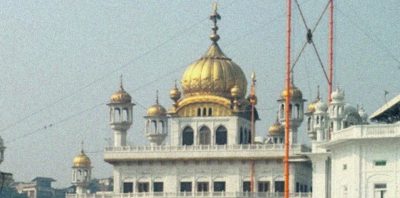Cover-up in India’s 1984 Golden Temple Massacre? British Involvement Revealed
Information Commissioner's anonymity order could hide Britain's role in 1984 bloodshed

The identities of civil servants who investigated British involvement in India’s Golden Temple massacre will remain secret, despite concerns that they could have potentially tampered with key evidence.
An anonymity order from the Information Commissioner means the government will not have to admit whether top officials active during the massacre were later allowed to control what files investigators saw.
The commissioner made the ruling after Whitehall claimed its staff could be targeted on social media which “may cause them distress.”
Indian troops shelled the Golden Temple in Amritsar in 1984, in a military operation against Sikh dissidents who were occupying their faith’s holiest site.
Hundreds if not thousands of Sikh pilgrims perished in the cross-fire.
In 2014, newly declassified British government files revealed that Margaret Thatcher had sent an SAS officer to advise Indian commanders how to raid the temple just months before the operation unfolded.
The revelation caused outrage among British Sikhs and then-prime minister David Cameron immediately launched a review — although he stopped short of ordering a full public inquiry.
Mr Cameron’s in-house review was conducted at breakneck speed by a Cabinet Office team and absolved the British military of any wrongdoing.
His probe claimed that the SAS role was “limited” and the officer’s advice was not heeded.
Sikh groups branded the review a “whitewash” and it later emerged that the Cabinet Office had not been given access to a crucial special forces file.
Concerns escalated further when Whitehall admitted in 2017 that it had allowed retired diplomats to select what files the Cabinet Office team saw.
The government then refused to rule out whether these ex-diplomats included a man called Bruce Cleghorn.
Just before the massacre Mr Cleghorn wrote a secret Foreign Office memo in 1984 about “the threat of Sikh terrorism,” warning:
“It would be dangerous if HMG [Her Majesty’s Government] were to become identified, in the minds of Sikhs in the UK, with some more determined action by the Indian government, in particular any attempt to storm the Golden Temple in Amritsar.”
Mr Cleghorn later went on to become a British ambassador before taking on a more low profile role at the Foreign Office as a “sensitivity reviewer,” vetting the department’s old files before they are released to the National Archives.
He was working in this sensitivity reviewer role in 2014 when the prime minister ordered the probe.
The Foreign Office has confirmed that its sensitivity reviewers were tasked with selecting files for the PM’s probe.
However, the department has refused to answer a freedom of information request by the Morning Star which asked if Mr Cleghorn himself was allowed to select files.
The Foreign Office told the Information Commissioner that the probe was “a significant and emotive issue for the Sikh community and if the identity of the sensitivity reviewers involved in the review were released then this could lead to significant activity on social media that could lead to them receiving attention that may cause them distress.”
In making her decision, Commissioner Elizabeth Denham said “even the perception of a possible conflict of interest adds weight to the argument” that the Foreign Office should reveal who took part in the review.
However, the Commissioner ultimately concluded that Mr Cleghorn’s right to privacy outweighed the public interest in knowing whether the probe’s integrity was tainted.
The decision has outraged Slough Labour MP Tanmanjeet Singh Dhesi.
He told the Morning Star:
“There seems to be a serious conflict of interest at the heart of the review into the British government’s involvement with the 1984 massacre at Sri Harmandir Sahib (Golden Temple) Amritsar.
“Given the enormous loss of life, there is overwhelming public interest in ensuring the government conducts the most transparent investigation.
“To ensure justice, I reiterate the demand for an independent inquiry, which I’m proud to say the Labour Party manifesto called for in 2017.”
*
Note to readers: please click the share buttons below. Forward this article to your email lists. Crosspost on your blog site, internet forums. etc.
Featured image is from Morning Star

